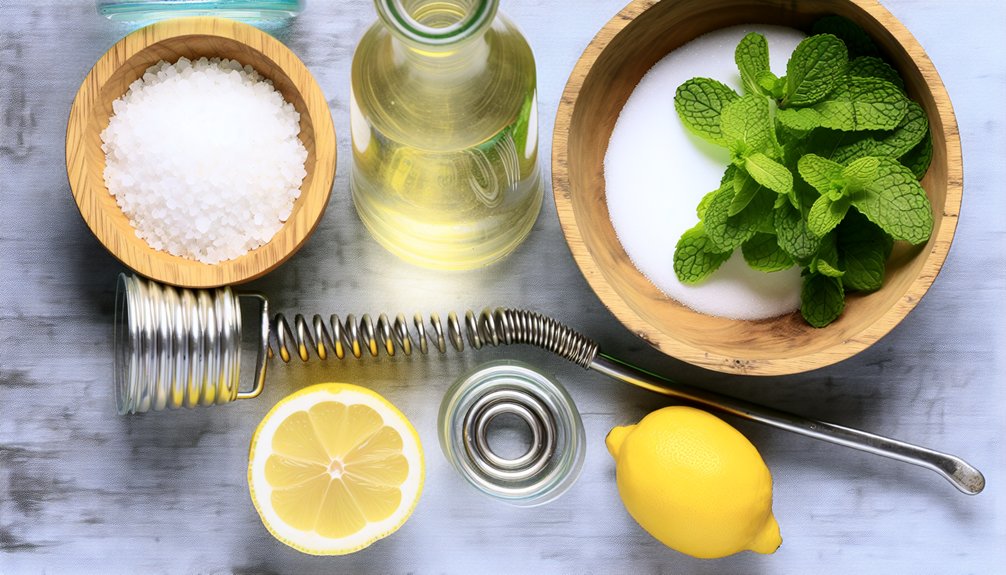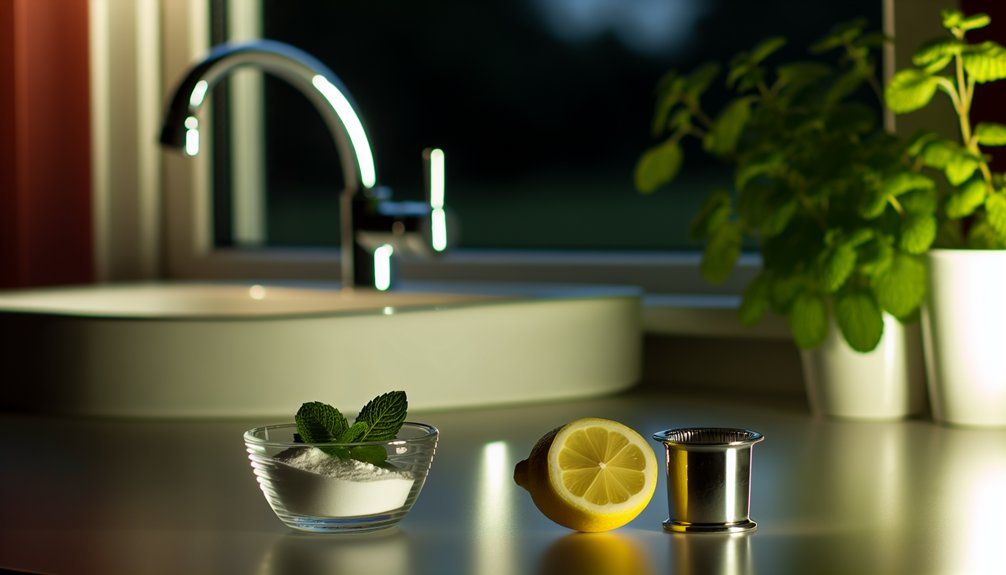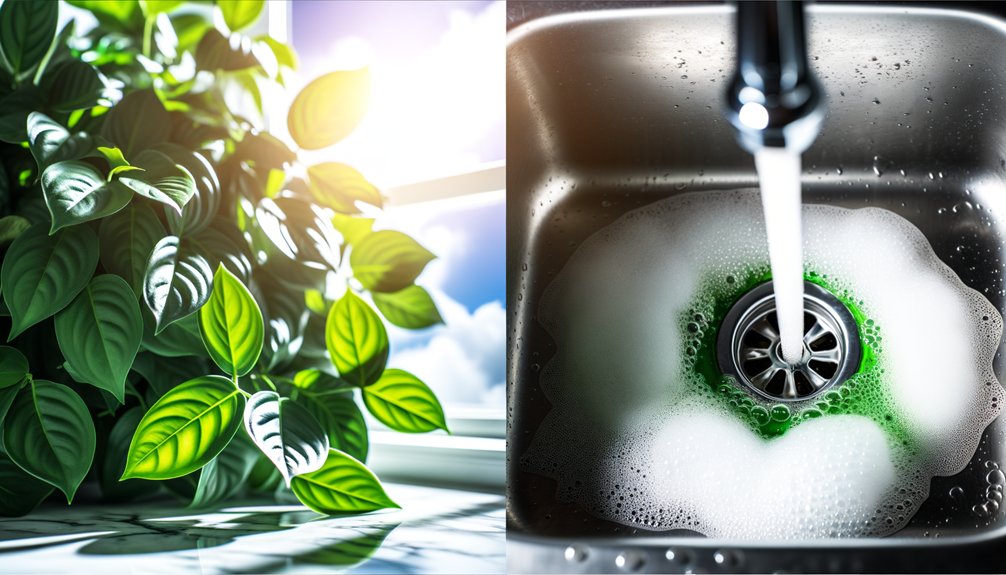Natural methods for removing tough clogs include several effective options. A mixture of baking soda and vinegar works by breaking down debris. Salt combined with baking soda can tackle stubborn clogs when rinsed with boiling water. Boiling water with dish soap is ideal for grease buildups, while Coca-Cola leverages its carbonation and acidity. Additionally, a wire coat hanger can help dislodge hair and other trapped materials. Exploring these methods can reveal more effective solutions.
Effective Natural Drain Cleaning Methods

When faced with tough clogs, individuals often seek effective natural methods for drain cleaning that avoid harsh chemicals. A popular natural solution involves using baking soda and vinegar, which together create a chemical reaction that breaks down food particles and organic material. To utilize this method, one can pour 1/2 cup of each into the clogged drain, cover it, and flush with boiling water after 30 minutes. For stubborn clogs, combining equal parts salt and baking soda can be effective; this mixture should sit for several hours before rinsing with boiling water. Additionally, a mixture of boiling water and dish soap can liquefy grease buildups effectively. Coca-Cola serves as another alternative, as its carbonation and acidity can dissolve clogs. For physical blockages, a wire coat hanger can be fashioned to remove hair and debris, followed by a flush of boiling water to clear residual buildup.
Common Causes of Drain Clogs
Drain clogs are a common household issue that can result from various factors. Understanding these causes can empower homeowners to take preventive measures.
| Cause | Description | Prevention |
|---|---|---|
| Grease Buildup | Accumulation from cooking oils and fats | Use proper disposal methods |
| Hair Accumulation | Hair trapped in bathroom sinks and showers | Regular maintenance |
| Food Scraps | Scraps washed down kitchen drains | Dispose of food properly |
| Frozen Pipes | Ice expansion leading to blockages | Insulate plumbing adequately |
| Tree Roots | Infiltration into sewer lines | Regular inspection and maintenance |
Poorly insulated plumbing, especially in older homes, is more susceptible to freezing, increasing the likelihood of drain clogs. Additionally, tree roots can create significant obstructions in sewer lines, necessitating professional intervention.
Tips for Preventing Clogged Drains

To effectively prevent clogged drains, homeowners should adopt a proactive approach that includes regular maintenance and mindful disposal practices. A primary strategy involves the proper disposal of grease and food scraps, which should be placed in jars or compost instead of being poured down the drain. This practice helps prevent clogs by reducing buildup within the plumbing system.
Additionally, homeowners can clean drains weekly with hot water to dissolve soap scum and grease. Monthly use of baking soda and vinegar serves as a natural cleaning solution to maintain clear pipes. Installing drain covers or screens is also beneficial, as they catch hair and food debris before entering the plumbing system.
Finally, educating all household members on proper disposal methods and the significance of avoiding non-biodegradable items is essential for long-term prevention of clogs, fostering a harmonious and efficient plumbing environment.
Frequently Asked Questions
What Is the Best Natural Clog Remover?
In the garden of household maintenance, natural remedies bloom like vibrant flowers. Among them, the vinegar solution and baking soda stand tall, creating a fizzy spectacle that breaks down clogs. The salt mixture, when left overnight, works silently, while enzyme cleaners nurture pipes gently over time. Hot water, infused with lemon juice, washes away grease, embodying eco-friendly options. Together, these plumbing tips cultivate good maintenance habits, ensuring drains flow freely in harmony with nature.
How Do You Unclog a Tough Clog?
To unclog a tough drain, one can explore various plumbing tips, including effective DIY solutions. Utilizing vinegar and baking soda creates a reactive mixture that aids in breaking down soap scum. Following this, flushing the drain with hot water enhances the clog removal process. Regular drain maintenance and pipe cleaning can prevent future issues. Incorporating natural enzymes in cleaning routines serves as a proactive measure against stubborn blockages, ensuring smoother flow in plumbing systems.
How to Clear Blocked Drains Naturally?
To clear blocked drains naturally, various drain cleaning methods utilizing natural ingredients can be effective. A vinegar solution combined with baking soda creates a powerful reaction, while hot water enhances the process. Incorporating essential oils or citrus peels can further assist in odor elimination. Enzyme cleaners serve as preventative measures, promoting plumbing maintenance by breaking down organic materials before they cause clogs. Regular application of these techniques can maintain ideal drain function.
What Will Dissolve a Blocked Drain?
To dissolve a blocked drain, various natural remedies can be employed. A baking soda and vinegar solution often initiates effective chemical reactions that break down clogs. Additionally, a mixture of salt water can further assist in this process. Enzyme cleaners target organic matter, while boiling water can dissolve grease. For a fragrant approach, combining lemon juice and essential oils enhances effectiveness. Alternatively, soda pop's carbonation may also aid in clearing minor blockages.


